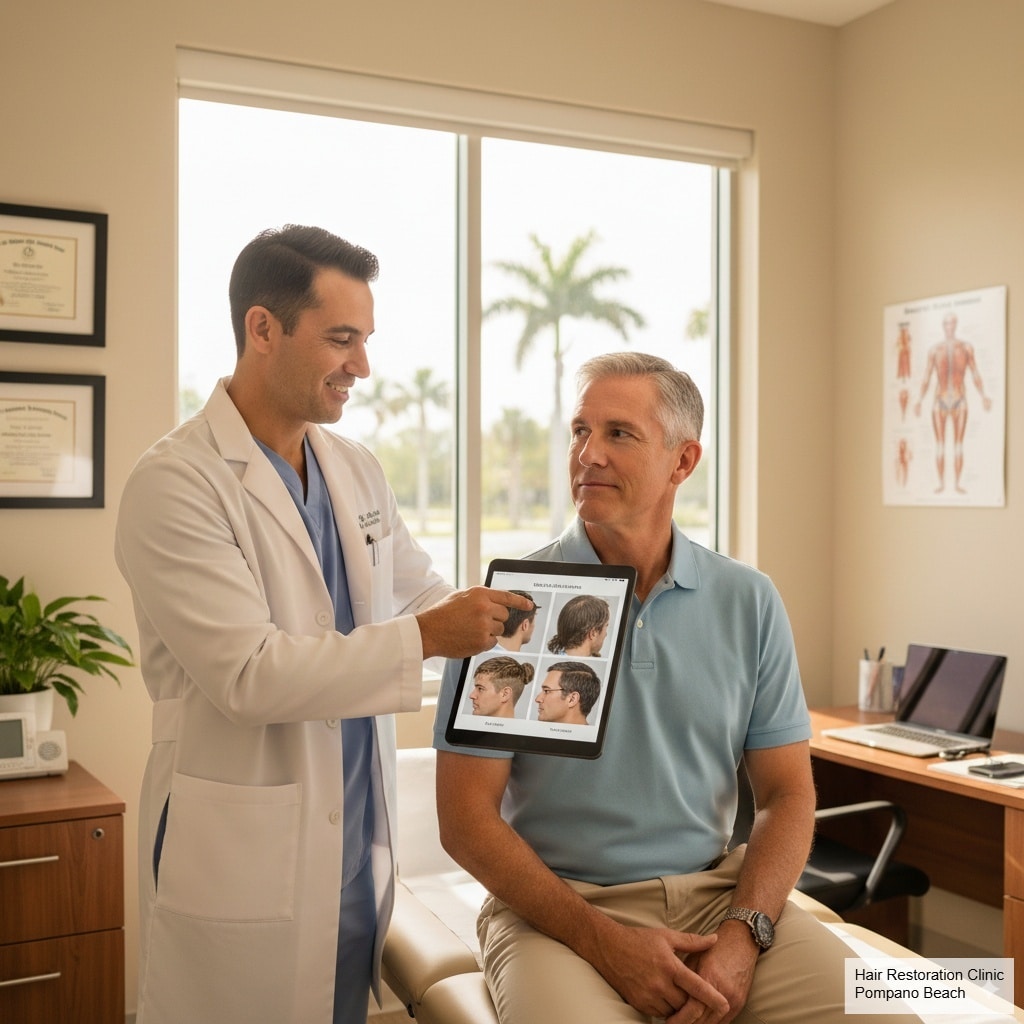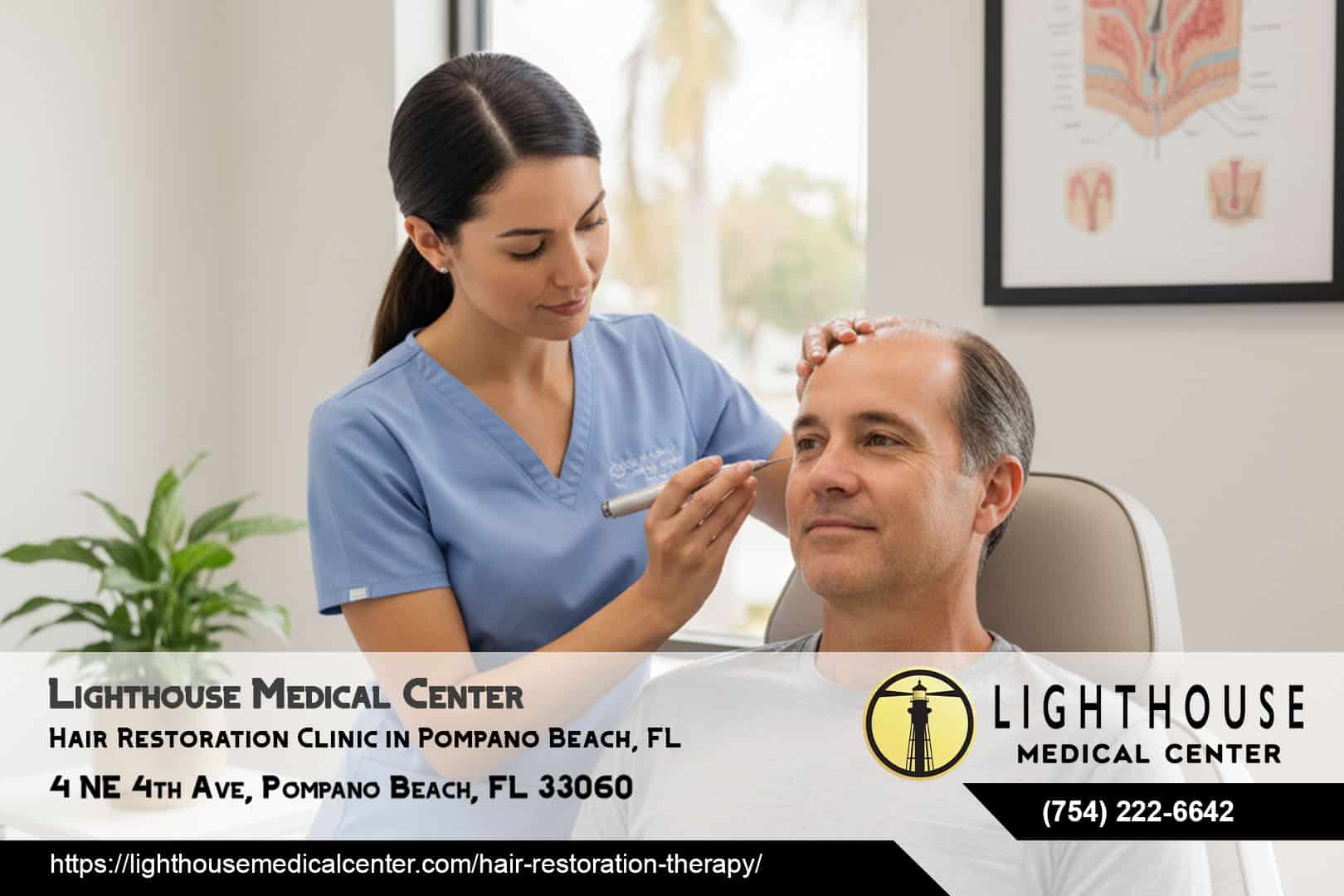Non-Surgical Treatment Methods
Non-surgical approaches focus on stimulating existing hair follicles and preventing further hair loss through less invasive methods. Platelet-Rich Plasma (PRP) therapy uses concentrated growth factors from the patient's own blood to stimulate hair follicle regeneration and improve hair density.
Low-Level Laser Therapy (LLLT) provides photobiomodulation to increase cellular energy production in hair follicles, potentially stimulating growth phase extension and improving hair quality. These treatments require regular sessions to maintain benefits and work best in combination with other therapeutic approaches.
Topical medications such as minoxidil and oral medications like finasteride help prevent further hair loss while potentially stimulating new growth. Lighthouse Medical Center customizes medication protocols based on individual patient needs and response patterns.
Treatment Selection Process
Consultation and Evaluation
Initial consultation at Lighthouse Medical Center includes comprehensive hair loss assessment, medical history review, and scalp examination to determine underlying causes and appropriate treatment options. Dr. Don Pham evaluates hair loss patterns, donor hair availability, and patient expectations to develop personalized treatment recommendations.
Diagnostic procedures may include scalp biopsy, blood testing for nutritional deficiencies or hormonal imbalances, and photographic documentation to track treatment progress over time. Detailed consultation ensures patients understand all available options and expected outcomes before beginning treatment.
Factors Influencing Treatment Choice
Treatment selection depends on multiple factors including hair loss extent, pattern type, age, overall health status, and desired outcomes. Patients with extensive hair loss may benefit from surgical transplantation, while those with early-stage thinning might achieve satisfactory results with non-surgical approaches.
Budget considerations, recovery time availability, and maintenance commitment levels influence treatment decisions. Dr. Don Pham discusses all relevant factors to help patients make informed decisions aligned with their lifestyle and expectations.
Risks and Side Effects
Surgical Procedure Risks
| Risk Type |
Description |
Likelihood |
Management |
| Bleeding |
Excessive bleeding during or after procedure |
Low |
Proper surgical technique and post-operative care |
| Infection |
Bacterial infection at surgical sites |
Low |
Sterile conditions and antibiotic prophylaxis |
| Scarring |
Permanent scarring in donor or recipient areas |
Variable by technique |
Advanced techniques minimize scarring |
| Poor Growth |
Inadequate graft survival or growth |
Possible |
Proper technique and post-operative care |
Non-Surgical Treatment Considerations
Non-surgical treatments generally present fewer risks but may cause temporary side effects including scalp irritation, temporary hair shedding, or allergic reactions to topical medications. PRP therapy may cause temporary swelling or bruising at injection sites.
Systematic medications like finasteride may cause sexual side effects in a small percentage of patients, requiring careful monitoring and dose adjustment when necessary. For patients experiencing these concerns, our sexual wellness services can provide additional support. Dr. Don Pham discusses all potential side effects during consultation to ensure informed consent.
Minimizing Treatment Risks
Lighthouse Medical Center employs strict sterile protocols, advanced surgical techniques, and comprehensive pre-operative evaluation to minimize risks and optimize outcomes. Post-operative care instructions and regular follow-up appointments ensure proper healing and early identification of any complications.
Patient education regarding realistic expectations, proper post-treatment care, and signs requiring immediate medical attention helps prevent complications and ensures optimal results. Dr. Don Pham provides detailed instructions and remains available for patient questions throughout the treatment process.
Advanced Hair Restoration Technologies
Modern Surgical Techniques
Contemporary hair restoration utilizes advanced technologies including robotic-assisted FUE procedures that improve graft selection and placement precision. Microscopic dissection techniques preserve follicular unit integrity while minimizing trauma to transplanted grafts.
Implanter tools allow for precise angle, direction, and depth control during graft placement, creating more natural-looking results that blend seamlessly with existing hair patterns. These technologies reduce procedure time while improving overall outcomes and patient comfort.
Regenerative Medicine Applications
Stem cell therapy represents an emerging treatment approach that may enhance hair follicle regeneration and improve treatment outcomes. Research continues into growth factor applications and tissue engineering approaches for hair restoration.
Lighthouse Medical Center stays current with advancing technologies and treatment modalities to offer patients access to the most effective and innovative hair restoration options available. Dr. Don Pham evaluates new treatments for safety and efficacy before incorporating them into practice protocols.
Frequently Asked Questions
How long do hair restoration results last?
Surgical hair transplant results are generally permanent because transplanted follicles retain their genetic resistance to DHT. Non-surgical treatments require ongoing maintenance to sustain benefits, with results typically lasting as long as treatment continues.
What is the recovery time for hair transplant procedures?
FUE procedures typically require 7-10 days for initial healing, with full activity resumption after 2-3 weeks. Transplanted hair may shed initially before permanent growth begins around 3-4 months post-procedure.
Are hair restoration procedures painful?
Modern techniques use local anesthesia during procedures to minimize discomfort. Post-operative pain is typically mild and managed effectively with prescribed medications and proper care instructions.
How many grafts are needed for full coverage?
Graft requirements vary significantly based on hair loss extent, desired density, and donor hair availability. Dr. Don Pham evaluates each patient individually to determine appropriate graft numbers for optimal results.
Can women benefit from hair restoration treatments?
Women experience excellent results from both surgical and non-surgical hair restoration treatments. Female pattern hair loss responds well to targeted approaches designed specifically for women's unique hair loss patterns.
What factors affect treatment success rates?
Success depends on multiple factors including surgeon experience, technique used, patient health status, post-operative care compliance, and realistic expectation alignment with achievable outcomes.
How much do hair restoration treatments cost?
Treatment costs vary based on procedure type, extent of treatment required, and geographic location. Lighthouse Medical Center provides detailed cost estimates during consultation based on personalized treatment recommendations.
When should someone consider hair restoration treatment?
Early intervention often provides better outcomes, but treatment can benefit patients at various stages of hair loss. Consultation with Dr. Don Pham helps determine optimal timing based on individual circumstances and goals.
Contact Information
| Business Details |
Information |
| Clinic Name |
Lighthouse Medical Center |
| Lead Physician |
Dr. Don Pham |
| Address |
4 NE 4th Ave, Pompano Beach, FL 33060 |
| Phone |
(754) 222-6642 |
| Website |
https://www.lighthousemedicalcenter.com/ |
| Service Area |
Pompano Beach, FL and Broward County |







